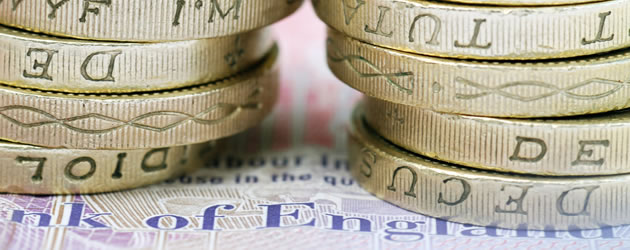Faltering Investor Confidence in the Eurozone weighed on the Euro (EUR) today as the Pound (GBP) benefitted from a lack of domestic data.
Soft Pound (GBP) Struggled to Capitalise as Dovish ECB Triggered Downturn for the Common Currency (EUR)
Underperformance on the UK’s PMIs throughout last week saw Sterling (GBP) weaken significantly across the board, as the Manufacturing, Construction and Services figures all fell short of forecast. Of particular concern was the marked decline in growth for the services sector, which dipped from 57.4 to 55.6, given that this industry contributes the largest proportion to the domestic GDP. Thoroughly dismissing the previous hawkish comments of Bank of England (BoE) Governor Mark Carney this data suggests that any tightening of interest rates by the BoE will be less likely to occur in the earlier months of next year, with many investors pushing back their bets for a hike well into the later quarters of 2016.
Tempering the turbulence of the GBP/EUR pairing, the single currency (EUR) entered a substantial decline on Thursday as a result of European Central Bank (ECB) President Mario Draghi making some significantly dovish remarks. Any relief pundits might have experienced as the ECB opted to maintain Eurozone interest rates at 0.05% was immediate superseded as Draghi alluded to imminent potential of fresh quantitative easing measures and a committed desire to keep the Euro weak. Although this prompted some very rapid gains for the GBP/EUR exchange rate, which advanced to a peak of 1.3737, the rally was not sustained for long.
Eurozone Investor Confidence Dives to Prompt Fresh GBP/EUR Conversion Rate Resurgence
To offer a further boost to the Euro, year-on-year German Industrial Production for July bettered forecast this morning to only drop to 0.5% instead of 0.3%. Reassurance that the Eurozone’s key economy is not slowing at quite the rate pundits had feared in response to instability on the global markets and the rumbles of currency wars, this nevertheless failed to dent the decided upturn on which the GBP/EUR currency pair has been trending at the start of the week. In part this is likely due to the news that China has now cut its growth projection from 7.5% to 7.4%, an admission that the economic situation remains grim.
Pushing the GBP/EUR exchange rate up further was the revelation of a seven-month low on the Eurozone’s Sentix Investor Confidence index, which fell from 18.4 to 13.6 below expectations. Another symptom of the continued impact of Chinese developments, this bolstered the pairing to a daily peak of 1.3701.
GBP/EUR Exchange Rate Forecast: Single Currency May Recover Ground with a Strong Eurozone GDP
Tomorrow’s Eurozone GDP could provide a substantial boost to the Euro, however, should the figure prove to be equal to or above forecast and thus restore general faith in the strength of the common currency. German Consumer Price Index data towards the end of the week may also inspire a rally for the declining Euro with a sufficiently strong showing.
The UK, meanwhile, will be seeing the release of July’s Industrial Production, Manufacturing Production and Visible Trade Balance figures on Wednesday. With an increased deficit anticipated this round of data could well return the Pound to dovish form, particularly as markets prepare for the upcoming BoE Rate Decision and 12-month Inflation Forecast report.
Current GBP, EUR Exchange Rates
At time of writing the Pound Sterling to Euro (GBP/EUR) exchange rate is moving in the region of 1.3686, while the Euro to Pound Sterling (EUR/GBP) pairing remains in a slump at 0.7306.



